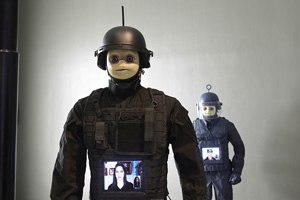I lost power for days after Hurricane Sandy, as New York’s East River flooded a Con Ed plant. If climate change means anything, it will not be the last time. But hey, look at the good news: in no time, I may have waterfront property.
Not that everyone is cheering, but New Yorkers are a hardy bunch, and they make do. With Adaptation, Josh Kline shows them coping after an unspoken disaster, and it takes some doing. They make it to work by water, climb out, and hose down. They gather after work for their own impromptu celebration, beers in hand. Kline has no end of threats from which to choose—and of new media to bring them alive. He also has no shortage of heroes and villains, and he cannot stop himself from pointing them out, but such is life in digital art and in a digital era, at the Whitney through August 13, and it is the subject of a longer and fuller review in my latest upload.
Kline has never seen a worthy cause that he cannot embrace. Climate change, automation, contagion, politics—all for him are immediate threats, and no one with a conscience can turn away. As one work puts it, Climate Change Is Personal Responsibility, and it speaks directly to you. In interviews, men and women face front to address the camera—and to put the unspeakable into words. They speak awkwardly, just as the task ahead of them is hard to explain, even to themselves. They speak out, too, from makeshift shelters, little more than tents with bedding and a monitor, now that the unspeakable has swept everything else away.
If the sheer rush from one threat to the next sounds like woke run wild, this is after all new media, with short attention spans and partisan politics. Kline’s basic tool is plain old video, on small-screen TV. Only recently has he moved toward larger projections, like Adaptation, and what he calls immersive environments. It may seem downright quaint, with not a pocket device in sight. As for partisan, the show is “Project for a New Century,” a sardonic play on Project for a New American Century—the neocon think tank, a platform for the voices that got us into twenty years of Mideast wars. Kline has deleted only the word American, for the threats are global, and phony patriotism only makes them worse.
If he still moves way too fast, he does have a running theme. Kline sees the issues as economic ones and the threats as coming to workers. They may need to swim to work, and they may find themselves out of a job. He pictures the pandemic as Contagious Unemployment—clear plastic viruses the size of basketballs, enclosing cardboard boxes for a worker’s personal effects. They are clearing out their offices, with barely a “thank you for years of service” in a faceless message. Such are “the sounds of severance,” texts continue, and they are just “wrapping things up.”
Kline got started with interviewing workers, for Creative Labor starting in 2009 and then Blue Collars starting in 2014. The first singles out the white-collar world, sustained by Adderall, Ritalin, Red Bull, and a French coffee press—on view in IV bags and on a shelf. They may see their work as “creative labor,” they say, but “sleep is for the weak.” Or maybe it is for the hip, dressed like Kline’s mannequins in the latest casual clothing. These are high-end environments, with celebrity clippings and pillars of digital light. The second project gets around to deliverers, restaurant waitstaff, and hotel room cleaners.
 For workers of any kind, this means war, and guess who are the casualties? Kline cannot stop at interviews when he can add body scans. Small business owners lie in plastic bags, as if preserved after death. Lowly workers leave their bagged body parts to the greater indignity of shopping carts. Digitizing the human body is here a tool of the ruling class, but also a metaphor and a question. Can one’s identity be subsumed by one’s job?
For workers of any kind, this means war, and guess who are the casualties? Kline cannot stop at interviews when he can add body scans. Small business owners lie in plastic bags, as if preserved after death. Lowly workers leave their bagged body parts to the greater indignity of shopping carts. Digitizing the human body is here a tool of the ruling class, but also a metaphor and a question. Can one’s identity be subsumed by one’s job?
Kline keeps his sense of humor, barely, but he is better off with his fears than his native optimism. Another America Is Possible pictures a “minority majority” country with a perpetual picnic and the burning and shredding of a Confederate flag. Well, fine, and the two-channel projection has a room to itself to enjoy it. The architects of the Iraq war offer their apologies, a nice bit of speech manipulation, through the mouth of a black woman, but do not expect any of these happy futures anytime soon. Is it enough to call them aspirational, even as the right continues to fight the Lost Cause? Tune in for the latest, on your phone or on TV.
Read more, now in a feature-length article on this site.
